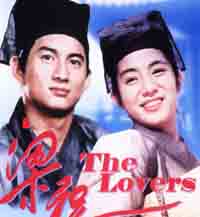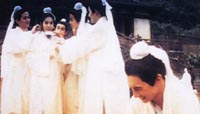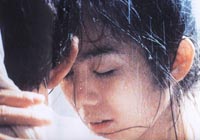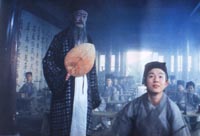|
||
|
It's a pity that Tsui Hark's non-martial arts films aren't better known outside Asia. The Lovers was made during Hark's most prolific cinematic period from 1990 to 1997. In 1994, Hark directed, produced and co-scripted this landmark drama. The Lovers is based on a traditional Chinese folk tale called The Butterfly Lovers. Over the centuries, it has been transformed into Chinese operas, countless stage productions and, of late, the cinema. The most recent (before Harks) film version being in the early 1960s as a Shaw Bros. musical titled, The Love Eterne. In many peoples' eyes, this Tsui Hark remake of The Butterfly Lovers is the best and most accessible. On its initial release in Hong Kong and Chinatown theatres around the world, The Lovers was a smash hit, commercially and critically. Starring screen newcomers Charley Yeung Choi-Nei (Fallen Angels, Task Force) as the tomboyish Chuk Ying-Toi, and Nicky Wu Kei-Lung (Thunder Cop, My Heart Will Go On) as the serious minded student Leung Shan-Pak, The Lovers can be seen as a Chinese version of Romeo and Juliet. The film is set in China during the Jin dynasty (circa. Shan Pak befriends the new arrival and to his horror begins to have romantic feelings towards his "mate" Ying Toi. Much of the sexual confusion and homosexual undercurrents of this traditional story are evident but remain undeveloped and treated in a light hearted fashion. The first hour of The Lovers is a highly enjoyable romantic-comedy romp. Hark's near-perfect cinematic touch has a Lubitsch feel about it. Characters such as Cheung Wai and Ingenue, servants to Ying Toi, provide some superb moments of humour. What separates this movie from similar high quality Canto comedy fare of the time, is the way in which the final third of The Lovers becomes an engrossing and inevitable tragedy. Director Hark moves seamlessly from his jokey gender bending elements of earlier scenes to symbolism and dialogue (feet binding, arranged marriages, caged butterflies) which are damming of patriarchal society. He shows how Ying Toi's mother (played by an imperious Carrie Ng, who won a HK film award for this role) will go to any lengths to gain male acceptance and security. There is a moment in The Lovers where a betrothed Ying Toi, whose face has been painted in bright fertility colors, turns to the camera - her eyes are dead and her face resembles a colorfully embroided death mask. Hark holds this shot for a second longer than one would expect - and the audience is treated to one of the great moments in Cantonese screen drama of the past twenty years. In short, Tsui Hark's The Lovers is a stunning example of Hong Kong cinema at its best. - JOHN SNADDEN "The Lovers finds Tsui
Hark at his stylistic best with "With this film, Tsui
Hark cements his reputation as one |

|
|





